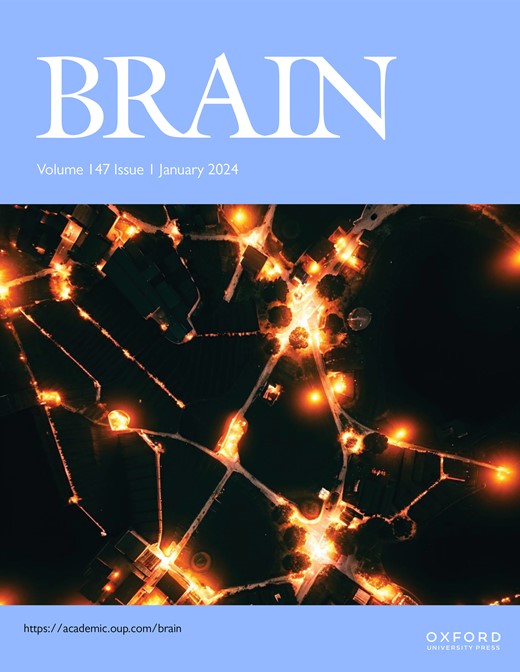The case for targeting latent and lytic Epstein-Barr virus infection in multiple sclerosis.
IF 10.6
1区 医学
Q1 CLINICAL NEUROLOGY
引用次数: 0
Abstract
Epstein-Barr virus (EBV) is strongly associated with multiple sclerosis (MS). It is likely to play a causal role in the pathogenesis of MS, possibly via triggering autoimmunity through molecular mimicry, autoantigenic presentation or immune dysregulation. Alternatively, evidence supports a direct role for EBV in driving MS disease activity via latent-lytic infection cycling either within the central nervous system or the periphery. We highlight the recent immunological and virological findings supporting the role of active EBV infection in MS, supporting an evaluation of anti-EBV strategies as potential treatments for MS. Anti-EBV strategies include CNS penetrant small molecule anti-viral agents targeting latent and lytic infection, and immunotherapies. Immunotherapies include EBV-specific autologous or allogeneic cytotoxic T-cells (CTL) and therapeutic EBV vaccines and/or immune checkpoint inhibitors to rejuvenate and boost endogenous EBV-targeted CTL responses. In parallel, several licensed MS disease-modifying therapies may work via mechanisms targeting EBV directly or indirectly. B-cell depleting therapies have been shown to have anti-EBV activity; additionally new strategies to target intrathecal B-cells, plasmablasts and plasma cells are being explored including high-dose anti-CD20 therapy, cladribine, proteasome inhibitors, BTK inhibitors, CNS-penetrant anti-CD20/CD19 monoclonal antibodies and CD19-targeted CAR T-cells. Innovative trial designs for proof-of-concept studies to test EBV antivirals and immunotherapies in MS are needed to catalyse a wave of drug development targeting EBV as a therapeutic strategy to prevent or treat MS.针对多发性硬化症中潜伏性和溶解性eb病毒感染的病例。
eb病毒(EBV)与多发性硬化症(MS)密切相关。它可能在MS的发病机制中发挥因果作用,可能通过分子模仿、自身抗原呈递或免疫失调触发自身免疫。另外,有证据支持EBV通过中枢神经系统或外周的潜伏性感染循环,在驱动MS疾病活动中发挥直接作用。我们强调了最近的免疫学和病毒学发现,支持活动性EBV感染在多发性硬化中的作用,支持抗EBV策略作为多发性硬化潜在治疗方法的评估。抗EBV策略包括针对潜伏性和溶解性感染的中枢神经系统渗透小分子抗病毒药物和免疫疗法。免疫疗法包括EBV特异性自体或异体细胞毒性t细胞(CTL)和治疗性EBV疫苗和/或免疫检查点抑制剂,以恢复和增强内源性EBV靶向CTL反应。与此同时,一些获得许可的MS疾病修饰疗法可能通过直接或间接靶向EBV的机制起作用。b细胞消耗疗法已被证明具有抗ebv活性;此外,针对鞘内b细胞、浆母细胞和浆细胞的新策略正在探索中,包括高剂量抗cd20治疗、克拉宾、蛋白酶体抑制剂、BTK抑制剂、cns渗透抗cd20 /CD19单克隆抗体和CD19靶向CAR -t细胞。需要创新的概念验证研究试验设计来测试EBV抗病毒药物和免疫疗法在MS中的应用,以催化一波针对EBV的药物开发浪潮,作为预防或治疗MS的治疗策略。
本文章由计算机程序翻译,如有差异,请以英文原文为准。
求助全文
约1分钟内获得全文
求助全文
来源期刊

Brain
医学-临床神经学
CiteScore
20.30
自引率
4.10%
发文量
458
审稿时长
3-6 weeks
期刊介绍:
Brain, a journal focused on clinical neurology and translational neuroscience, has been publishing landmark papers since 1878. The journal aims to expand its scope by including studies that shed light on disease mechanisms and conducting innovative clinical trials for brain disorders. With a wide range of topics covered, the Editorial Board represents the international readership and diverse coverage of the journal. Accepted articles are promptly posted online, typically within a few weeks of acceptance. As of 2022, Brain holds an impressive impact factor of 14.5, according to the Journal Citation Reports.
 求助内容:
求助内容: 应助结果提醒方式:
应助结果提醒方式:


